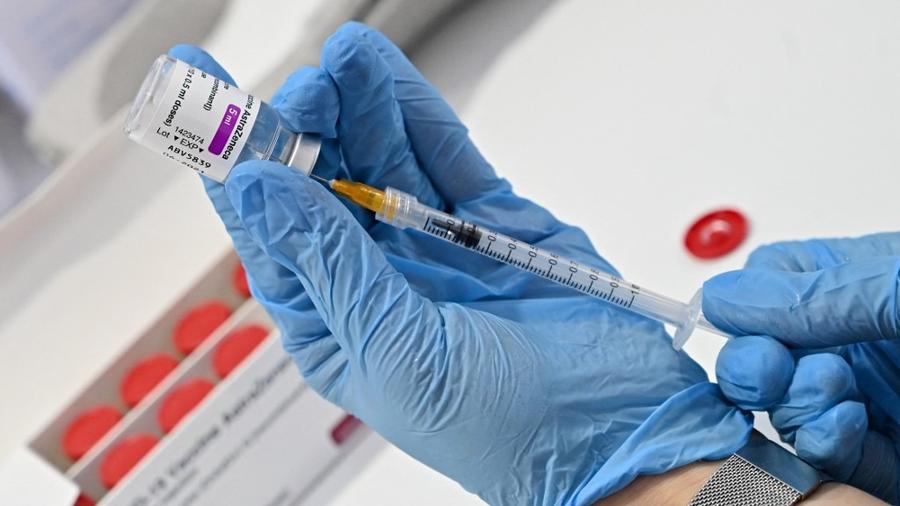 A medical worker fills a syringe from a vial of the AstraZeneca vaccine on March 24, 2021 at a vaccination hub outside Rome's Termini railway station. (ANDREAS SOLARO / AFP)
A medical worker fills a syringe from a vial of the AstraZeneca vaccine on March 24, 2021 at a vaccination hub outside Rome's Termini railway station. (ANDREAS SOLARO / AFP)
Germany has followed Canada's lead in moving to put age restrictions on the use of the AstraZeneca COVID-19 vaccine because of fresh concerns about links between vaccination and blood clots.
Following an emergency meeting on Tuesday involving Health Minister Jens Spahn and 16 state health ministers, a decision was taken to stop routine use for people aged under 60.
On Monday, Canada's vaccine advisory committee recommended pausing vaccinations with the jab-developed by the Anglo-Swedish drugmaker with Oxford University-in people aged under 55 due to the clotting concerns.
However, the German decision means the vaccine can still be administered "at the discretion of doctors, and after individual risk analysis and thorough explanation", according to documents seen by news agency DPA.
ALSO READ: AstraZeneca's EU vaccine woes deepen on clots, nationalism
However, the German decision to stop the use of AstraZeneca COVID-19 vaccine for people aged under 60 means the vaccine can still be administered "at the discretion of doctors, and after individual risk analysis and thorough explanation", according to documents seen by news agency DPA
Before that meeting took place, the country's permanent vaccine commission, known as STIKO, had already published advice saying that the AstraZeneca vaccine should only be given to those aged over 60, a decision it said was made "on the basis of currently available data on the occurrence of rare, but very serious thrombosis-related side effects".
Chancellor Angela Merkel said it was wise to be cautious. "Trust comes from the knowledge that every suspicion, every single case will be looked into," she said.
"We're doing everything, through transparency, through information through clarity… to create this confidence that we're not withholding anything."
Last month, many European countries, including Germany, temporarily suspended use of the vaccine because of concerns about blood clotting in people who had received it, but use resumed after the European Medicines Agency, or EMA, said it was safe.
Since then, however, authorities in Canada have looked at a study by Germany's Paul Ehrlich Institute, which says rates of blood clotting could be as high as one in 100,000 people, rather than one in 1 million, as previously stated.
Positive message
"The positive message is that the vaccine from AstraZeneca should continue to be vaccinated for people who have reached the age of 60," said Klaus Holetschek, health minister of Bavaria, and chairman of the health ministers' conference.
"The studies continue to show that this is a vaccine that is effective against severe bouts of the disease. We need it to be effective in the face of the third wave and dangerous viral mutations, we need it to move forward quickly."
While questions over the AstraZeneca jab continue, there is a growing possibility that Russia's Sputnik V vaccine could be used in Europe, with the Times newspaper reporting that the French and German governments are in talks with Russia.
The EMA has launched a review of the product, which is a crucial step toward its potential clearance for use in the European Union, and when asked last week about Sputnik V, Merkel said: "I have been of the opinion for some time that we should use any vaccine that has been approved by the European medicines regulator."
It is understood Merkel, French President Emmanuel Macron and Russian President Vladimir Putin held a video conference on Tuesday night, when the possibility of purchasing the vaccine was discussed.
"All vaccines are welcome if they have been approved by the EMA", a spokesman for the German Health Ministry added.
READ MORE: African countries stick with AstraZeneca in shots rollout
In Italy on Tuesday, Prime Minister Mario Draghi received his first dose of the AstraZeneca vaccine, which his government temporarily halted the use of last month.
Liu Xuan in Beijing and agencies contributed to this story.


